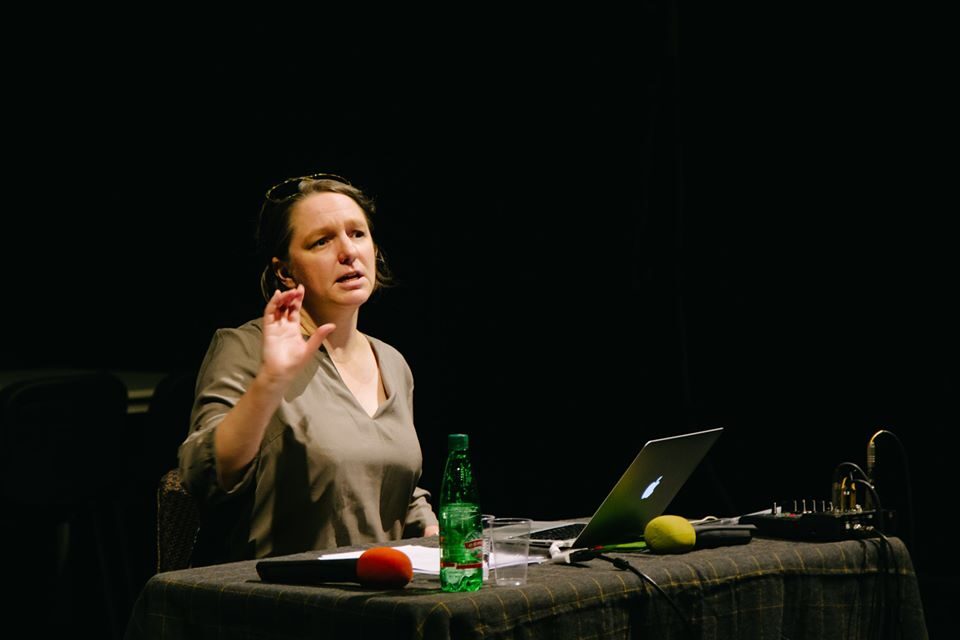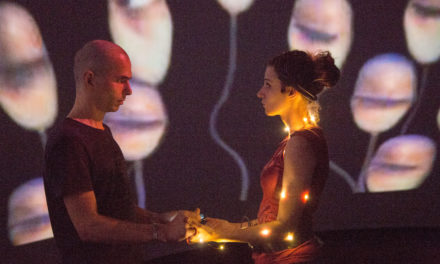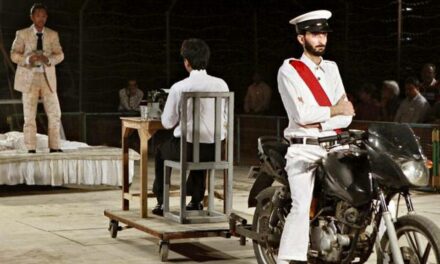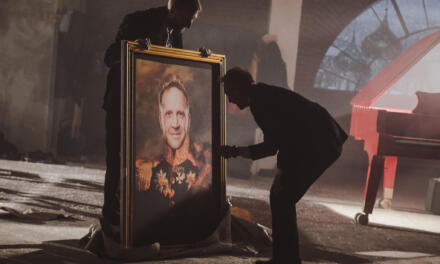Ulrike Syha was born in 1976 in Wiesbaden, Germany. She studied Dramaturgy at the Hochschule für Musik und Theater in Leipzig, and worked for several years as an assistant to the director at Schauspiel Leipzig when Wolfgang Engel was Artistic Director. Since 2003 she has been a freelance writer and translator of plays in Hamburg, Germany. Her most famous stage plays and radio plays are: Drift, Nora, Hedda and Their Sisters, Private Life, The Passenger, China Shipping, Commercial, Five to Zero/Export, Something is Pressing, Bed and Breakfast I-III, Nomads, Artificial turf, Driving in Germany, and Do Not Pass Go among others. As a writer, Syha has won several awards and stipends such as the Kleistförderpreis für junge Dramatiker (2002), a fellowship at Akademie Schloss Solitude (2006/2007), a stipend at Deutsche Akademie Rom/Casa Baldi (2008), the Hamburger Förderpreis für Literatur (2010), Robert-Gernhardt-Preis (2014), Walter-Serner-Preis (2015), and Hamburger Literaturpreis (2019). She has been writer-in-residence at Nationaltheater Mannheim (2009/2010), and was invited to the renowned Mülheimer Dramatikertage twice. In 2018, she won the Heidelberger Stückemarkt playwriting away for her play Drift. As a translator, she translates plays from British and American English, including those by Martin Crimp, Caryl Churchill, and Tariq Ali. In 2016, she received a stipend from Deutscher Übersetzerfonds to translate Wallace Shawn’s new play Evening at the Talk House. Ulrike Syha’s plays, radio dramas and translations are published by Rowohlt Theater Verlag, in Reinbek, Germany. Syha occasionally teaches workshops and organizes cultural events of all kinds. Currently she is a writer-in-residence at HWK in Delmenhorst, Germany. Her newest play Public Space (Der öffentliche Raum), is opening in March 2020 at Theater Drachengasse in Vienna.
Ivanka Apostolova Baskar: Ulrike, let’s talk about your work. Your plays promoted and published by the Goethe Institute have current themes, compelling titles, and most of them have been staged. How do you select the theme for each one, and how do you build the characters? Many countries’ theatres have a shortage of well-constructed female characters, how do you deal with this dramatic challenge?
Ulrike Syha: I divide my plays into those that are comedies – I think they’re funny, but in a dystopian way – and the other plays are about life in big cities in the future, so maybe I could categorize them as science fiction. Most of them have a kind of hidden crime that does not become the focal point of the story. Usually the main characters are men – sometimes it is easy for me to switch genders as I write, and to see the world with their eyes. However, I recently dedicated myself to writing female characters because I have found there are not many that lift the spirits. Older women are a neglected group, especially if they’re over 50. It’s complicated to get their stories on stage, and there aren’t many plays with older women. It’s a sad situation, so I think we need to change that.
IAB: How do playwrights manage to earn a living in Germany? Do they manage to live only through from plays, such as commissioned scripts, or from regular collaboration with a particular director based on good synergy and related artistic sensibility?
US: I find it very difficult to generalize and conclude on behalf of everyone, because there are different trends and fashions. If you’re lucky, you’re just in and you’re considered a relevant artist. It’s usually like this when you’re young. When you turn 40 it gets harder because theatres are usually more interested in young artists. They assume that when you are over 40, you stop writing or you have found a serious job in education and you no longer need the support of the ministries or other funding bodies. Or, you are already well-known and have enough theatres to work with. But that’s not true, as many mid-career playwrights barely survive. They are not paid well enough, and many opportunities are no longer available to them. But I still think it’s possible to make a living from theater if you don’t belong to the most famous group of writers who have several theatres they can work with, or the same theatre hires them to write plays on commission. It is not impossible to live of off plays that you write or are hired to write, but it takes years and years to successfully sell them.
Since programs in theatres are usually done a year in advance, I’m not clear about how fashions and theatrical trends work. This or that topic suddenly emerges as a trend or fashion, causes ripples from the stage, then all of a sudden it’s all over. Besides these trends, the general political agenda plays an important role in determining the topic of the day. Theater has a desire to promote the new – new names and new voices, new stories told in inherently crazy ways, new faces, new works, new topics. But all of a sudden, you get old and uninteresting. So you have to find survival strategies that entail finding another job in the theater industry that you can make a living from.
I’m not advocating that everyone should get into education. We produce too many artists in Germany and I suspect we don’t need new or more academies. I think we’re good with what we already have. It’s difficult, but it’s not impossible to succeed in theater. I know it’s much harder in other countries, where it’s a luxury to live off of theater work.
IAB: Is it natural and inevitable to produce so many playwrights, who may or may not be talented? Hyper-production creates intense competition, but how justified is that competition?
US: This is a difficult question. It depends on which part of the theater we’re talking about. If you look at acting schools, we have very well-trained actors. Some of them come from private schools where they train to become TV actors, which means they learn a completely different acting methodology to that of stage acting. It’s probably thought that not every actor will work full-time, and that many will drop out of acting because they don’t feel happy with what they do at the academy. Of course, we also have artists who never train or study writing, but they are working in theater. We also have a lot of people who teach creative writing, but never write. In the end, you rely on the fluctuation of these things. But I still feel uncomfortable with promising those young people a future in theater, because we all know how hard this is to achieve. It’s likely to get harder and harder as culture budgets are cut and money dries up; I personally do not want to promise young people that a bright future awaits them.
IAB: What is your attitude towards this global hysteria about the constant need for new things, new names, and new acts? Is a consequence of new things an unavoidable adrenaline rush? What do you think about this state of affairs?
US: I think that’s the hidden side of the high concentration of theatres in Germany. We have a lot of theatres and artists, but it means there is a high degree of competitiveness. That’s why if you want to be heard, you have to be loud and advocate for something that is fresh and attracts the audience’s attention. The same thing happens with small theatres, especially in the so-called “provincial” areas – I’m not happy about this word and its common use – but they also fight fiercely to be heard and noticed, and if they fail to create fascinating, new plays, critics won’t come to small towns. This is a part of the system that you can’t really avoid.
The next expectation is to be consistent and continue to work in the best way possible with other artists, but it’s hard. New theater voices are constantly emerging, there are theatres that only work with new faces, and they reject previous ones as obsolete. Although, theater always needs freshness. It’s hard, there are theatres where there are always the same people. You always go to shows in the same cities, but it still needs balance. But how can that balance be achieved? The balance is probably a market – and the theatres in Germany are a market, whether they like it or not. It means the state of the market is one of high competitiveness.
IAB: How is it that in Germany – with such a large system in place for the development of contemporary theater and performing arts – it is inevitable for performance and theater to become part of a commercial market? By what criteria does one become a star in Germany, as an actor, director, playwright, ensemble, troupe, or collective? How can someone gain an agent in such a developed theater system?
US: Ah, I find it difficult to say that it’s easy to avoid such a structure. For example, in Scandinavia, countries give their artists lifelong scholarships so they don’t have to live off their art. You’d think they are probably producing less capitalist art, but there is also competitiveness. Here, it’s the question of who receives such a scholarship. In Germany there are many artists, while in Norway there are few artists, so I can’t imagine how that could work in Germany. We also work in Austria and Switzerland, so I think there will always be competitiveness. I do not know how and if competitiveness can be avoided.
I’m going to say there are some things that will make money, that there are some projects that have to be part of the system – that’s the rule of the game. Then, I can find some free time to create new work that I will not get rich from, but can create because I have worked hard all year to earn money so I can create something completely different. You have to find strategies to help you survive, but competitiveness makes you stronger.
However, there are many ways to collaborate. Networking is a positive way to collaborate. Sitting together at a table collaborating can make competitiveness less intrusive, because together you create and work on the task, and work together to solve the same problem. That’s why I’m a fan of networking.
IAB: What is it like in drama networks? What do you need to achieve to get an agent, or to be recognized by a good agent? Does the agent improve the author’s career in Germany?
US: Most often, it is not the agent who helps you advance your writing career. We have many festival programs and programs to develop of new artists, whether or not they studied at drama academies. But even those who studied need to attract attention. This can be done through weekly, mobile programs where you meet new, young artists who read excerpts from plays, with actors and a group of mentors, then discuss them. Such programs and festivals are the right place for theatres to find new, interesting talent.
I’m very pleased with my agency, they work hard for their playwrights and represent them well, but there are many agencies that do not do this for their clients. I know this from colleagues who say their agents have so many clients that it is impossible for them to have work for all of them. Of course, new artists emerge every year, and agencies have few employees. Only a handful of people manage all the responsibilities.
IAB: In Germany, what criteria determines a good director, stage designer, costume designer, light designer, and so forth?
US: As a playwright, you definitely need a director. Without the right director, you remain unrecognized. As a director, you must have a recognizable, authentic way of directing. Otherwise you will remain unrecognized.
It’s funny that we talk about it so often, but it’s hard to find a good director who can successfully direct good comedies, because comedy today is viewed with disgust and no one wants to work on it. But directing a comedy requires special skills. We have some really good directors with authentic stage languages who are not very good at directing dialogues; moreover, they publicly say that they are not interested in directing dialogues.
If you have a play that requires certain directing skills, finding a suitable director is not easy. This uncertainty is also present in the premiere of any new drama that is unknown to the audience. You are looking for a good, reputable, authentic director on the one hand; on the other hand it is not fair, because at the premiere you see their interpretation of your text. It’s delicate, but it’s still important to find the right director to work with.
For example, after I worked as a playwright in Chemnitz, the director and I worked on three projects. It was great because you work with the same actors, and you really develop a theatrical language together with the director, which is very important.
If you are a costume designer or stage designer, you depend on the director in some way. I know that costume designers are unfortunately not well paid until they get into opera. So they have to work on many projects every year, traveling frequently from one city to another to survive. In a way it’s a difficult situation, though I know that almost everything today is down to the director’s choice. We also have the issue of existing partnerships and creative teams, which in some cases were formed during their studies.
IAB: Today in Germany, who are the directors of the mainstream, alternative and experimental contemporary theater that stand out from the others?
US: Right now in Hamburg, there is a great festival at Körber Studio Junge Regie. It’s a festival of young, rising artist-directors, who are still at the academy and showcasing their first projects. This festival is great for their careers.
You usually see big names at the Theatertreffen Berlin Festival, like Falk Richter. He is a renowned director. He’s also a playwright; Richter made a fantastic version of the Elfriede Jelinek play Am Königsweg (2017). Then there are some great directors from Hamburg Schauspiel, a theatre run by director Karin Beier.
There are some really good names that were made famous by working on the classics in their own, original way. It’s rare to become popular with contemporary plays, only a few have succeeded and still work exclusively on modern texts.
Today, there are so many different formats and modes of expression in theater. This doesn’t mean the audience doesn’t want to see contemporary works. On the contrary – we want all existing dramatic formats of theatrical expression.
IAB: What do you think of the phenomenon of classics serving as a powerful authority on the past and present? Classical dramas are always attractive to new generations of directors; they have potential to encourage new generations of filmmakers to see different views and interpretations of the work. Why do the classics recreate themselves through directors’ visions?
US: On one hand, it comes from the audience because they want to see things that are familiar to them. In Germany, there is a fear that the audience will not get what they expect from an unknown play. It should also be remembered that many theatres in Germany are bourgeois and classical, belonging to the middle class and their tastes, and that audiences treats the classics as if it is their own treasure trove – that the classics are the brain of the nation.
As I said before, it all depends on the director’s decisions and vision. They are judged on what they do with the classic text on stage. Many comparisons can be made between how established and new directors interpret the classical text. Many people do not know the original text of the classical play, so they do not know what you actually changed.
I have to admit that I enjoy going to the theatre and seeing a classical author occasionally, but only if I know the work of the director and the creative team. I avoid seeing the type of play I’ve seen more than twenty times because I’m easily bored. After 10 minutes it becomes clear whether I have seen that approach before, and I get bored if I understand the director’s vision.
IAB: Can you share more about boredom in the theater, such as getting bored with a performance, the predictability of theater, and why theater has becomes boring and uninteresting to some younger audiences?
US: Getting bored in theater depends on what you do in life and what kind of person you are. Boredom depends on many factors. I don’t think young people aren’t interested in theater or performance. Some things can change in order to reach a younger audience more successfully, and there are creative ways of reaching a young audience.
I live in Hamburg, where theater is a school subject and students have an exam at the end of the class. It is a normal school subject, and many choose this subject because they are interested in drama. Although, for the generations who have grown up in front of the internet and TV, theater helps them see television programs with different eyes. I think there will always be audiences in theatres, you just have to find your own approach, and locate the right audience for your theatre.
I have nothing against digital tools in theater. They are new stage forms that are emerging from the visual arts, digital art, theater and performance art, and may be the big thing right now. On the other hand, the thirst for words, stories and living bodies is still present so that’s why it’s hard to predict. But I think there are many opportunities for the theater to reach audiences through different formats.
IAB: What do you think about political correctness, which runs deep in the arts? Are people becoming aware that political correctness kills artistic expression?
US: I think that the opportunity to say incorrect things on stage and on film should persist. Yes, this is problematic due to political correctness that is applied to theater. On the question of polarization – the number of women appointed as theater directors in Germany – is shockingly low. Things are still not equal, they are below 50% so we can see that something is wrong with these appointments in Germany.
IAB: What do you think about hyper-productivity in theatre? Do artist residency programs really affect and enhance the careers and success of the artist? How much do they influence personal, artistic development?
US: Personally, I like to go to writer residencies because I am most productive in countries where I do not speak the language, and because I have no other commitments and engagements I can write. I finished my play Drift in Slovenia during a writer residency program.
It’s up to each writer, but one thing I don’t want is a residency that comes with a project proposal package. For example, if a residency requires that a project must happen in Argentina, it’s very difficult and problematic because I live here. That’s stupid, so I wonder what I have to say about Argentina and why I should say anything at all. This concept is sad, I think artists need to stick to things or topics that they have experienced, but should have the freedom to write what they want to write during their stay. Knowing your own country gives you many ways to communicate with people in your own country, but in examples of residences requiring a project from you, you wonder what they want, and what to give them.
You often find ways to collaborate. I know writers who don’t want to be bothered and if they go on residencies they won’t be able to write, so they need a lot of time to adapt. I’ve been to a lot of
residences; some of them have been great experiences for me, like Solitude Residence in Stuttgart. Such residences last a year. But despite criticism, I still love residences very much, and go whenever I have the opportunity.
IAB: Can you make a comparison between contemporary German theater and contemporary European theater? In which direction do the tendencies towards internationalization, networking, mobility, co-producing incentives and other formats of international cooperation lead?
US: Lately Germany has become the engine of this kind of project because there are so many funds available to us. There’s a lot of European money available for projects, but this money is only for the big players and not the little ones, so that is why they are a big problem. If we want to talk about European theater, today it is only available for big stars, and you will not have the chance to do international co-productions unless you dedicate a whole year to fundraising.
Especially in German theatres, the director’s position is much stronger than in other European countries. There is also the fact we have a lot of state-funded public theatres, which usually have a repertoire system that is different from that in many other countries. This is positive when comparing Germany with other countries.
Here, many foreign playwrights are staged but in other European countries, it is not so common. Maybe it exists, but only at the academic level – the authors are mentioned in the essays and research.
We are aware that we all create theater in different ways, yet they are not always possible to compare these ways to each other. For example, in Asia it’s not at all easy to establish international co-productions at the moment. They exist but develop too slowly. And here, we face the reality that perhaps only German theater tends to be international. If I look at other countries, they are more focused on themselves. At least right now it is like that.
IAB: What are your predictions for the internationalization of the theater? Do you think cultural policy will make things better?
US: I really can’t predict where internationalization will lead. It depends on many circumstances – it has to do with how you understand life, but I can still foresee new projects that would not have a classic, dramatic setting. There is a lot of site-specific performance, and performances that use digital technologies. All of this can be strengthened in the future, but it’s still difficult to predict because there is still a need for a good story and a good storytelling.
IAB: Does your Ministry of Culture develop and implement good strategies for the international promotion of its artists?
US: Yes and no. Everyone draws from the same sources; therefore the same names are always promoted. There is an emphasis on the German language, but there are still many, many artists. We’re not rich because we have one or two good authors, we’re rich because we have many really, really good writers. Sometimes I’m a bit sad that I’m not one of those in the group who are constantly promoted, but cultural politicians are constantly promoting the same people and do not reflect the distinctive diversity of theater here. I hope that one day diversity will be appropriately reflected in international promotion.
This post was written by the author in their personal capacity.The opinions expressed in this article are the author’s own and do not reflect the view of The Theatre Times, their staff or collaborators.
This post was written by Ivanka Apostolova Baskar.
The views expressed here belong to the author and do not necessarily reflect our views and opinions.


















